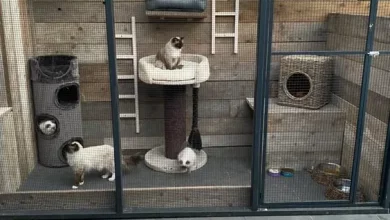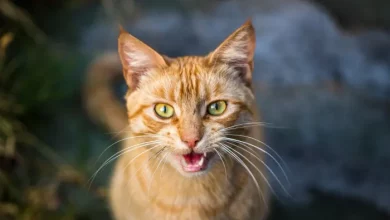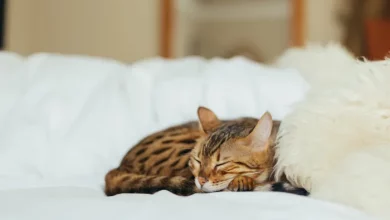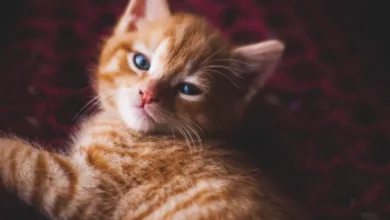Why Do Cats Lick and Is It Dangerous?
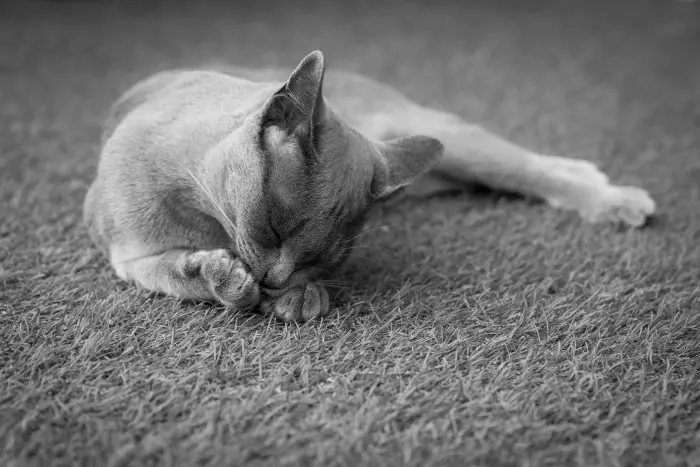
What Causes Excessive Cat Licking?
Your feline friend has a unique way of communicating with you. Although you adore your furry companion and reciprocate their Affection, you may be perplexed why your cat licks you excessively. Is it a means of showing lovAffection? Does your cat want to groom you? Or, could it be that your cat is fond of your taste? Numerous factors could contribute to your cat’s excessive licking behaviour. Your cat may even lick items such as furniture, floors, walls, toys, dead rodents or birds, and other things that pique their interest.
Determine whether your cat displays typical feline conduct or results from another factor, such as an undiscovered health ailment.
10 Causes of Cat Licking:
Affection
Instinct
Anxiety and Boredom
Territoriality
Pica
Grooming
Tasting
Health Concerns
Old Age
Allergies
1. Showing Affection
Have you ever wondered why cats lick their owners? When cats are still kittens, their mother cat uses its tongue to groom them repeatedly. This is a gesture of love and Affection and a way to keep the kitten’s eyes clean and fur unmatted. Cat tongues have hundreds of tiny papillae or spines that are natural cleaners. It’s common for cats in a bonded pair or littermates to lick and groom each other’s faces, ears, fur, and feet. Your cat may also be exhibiting a similar sign of Affection towards you.
What is the reason behind my cat licking me? It could be due to the behaviour learned during their kitten days, which they continue as a show of Affection. They might also exhibit similar grooming behaviour towards other cats in the household, dogs, or other human family members. However, others may not appreciate this behaviour and could be hazardous, as a cat’s mouth contains harmful bacteria. When other pets or people try to avoid unwanted licking, they set healthy boundaries. Therefore, it is recommended to reciprocate the same behaviour for the overall well-being of all family members.
Is It possible that my cat enjoys the taste of me? Don’t worry; they’re not planning to harm you. If you notice your cat licking you, especially after exercise, there’s a chance they’re savouring the salt on your skin. Consider taking a shower before cuddling with your feline friend.
Can Cat Saliva Be Harmful to Humans?
In short, yes, cat saliva can be harmful to humans. Inside a cat’s mouth live various kinds of bacteria, such as Pasteurella multocida, Staphylococcus, E-coli, and Salmonella, which can potentially infect humans. These bacteria are zoonotic.
Is it Safe to Let My Cat Lick Me?
SupposeSuppose you have a weakened immune system, open wounds, a history of slow-healing damages, or are vulnerable to infection. In that case. In that case, it is not recommended for you to allow direct skin contact with your cat’s tongue. Human medicine acknowledges the severity of cat bites due to the presence of bacteria in cat saliva and their sharp teeth. The sharp fangs inject human skin through bites, which creates a small opening that promptly seals, trapping the wound and providing an ideal environment for anaerobic bacteria to flourish.
2. Feline Instincts
The instinctual nature of cats is quite remarkable, given their predatory nature. Despite being domesticated for centuries, many cat breeds still exhibit a wild and predatory demeanour. As any cat owner can attest, their feline companions hold a specific authority in the household. Cats retain several instinctual behaviours, such as hunting, chasing, trapping prey, and even stalking their human counterparts.
When cats hunt and capture mice or birds, they play with their prey until it succumbs to death. Occasionally, they may pause to lick the lifeless body from head to toe until they lose interest. They would mainly consume their catch in the wild, but domesticated cats tend to have more free time and may sometimes kill for fun. They trap and play with their capture until they find something more appealing to do.
What is the Reason Behind My Cat’s Biting and Licking Me Behaviour?
Your feline friend might behave by biting and licking like how they would interact with another cat. They may begin with a gentle and affectionate approach and then abruptly bite. Although this behaviour can be adorable, not everyone appreciates being bitten when trying to pet their cat.
Consider refraining from using your hands to play with your cat and, instead, opt for a feathered or wand-based toy as a replacement. Direct contact between your hand and cat should be avoided as the bites could potentially cause harm, especially to elderly or sensitive individuals and young children or infants, if their skin is accidentally pierced.
Recommended For You
3. Anxiety and Boredom
Cats exhibit unusual behaviours when they are not sufficiently stimulated and become bored or anxious. Frequently, compulsive licking may emerge due to boredom, escalate to anxiety, and lead to hair loss and skin sores. Your cat might be grooming excessively due to a lack of activities. They may turn to obsessive grooming if they are not appropriately stimulated, lacking in toys and cuddles, or missing other forms of healthy diversions.
Regarding anxiety, cats can experience it due to various reasons. These reasons may involve modifications in the household, the arrival of a new individual or pet, the absence of a pet, person, or friend, hormonal imbalances, loud sounds, the presence of stray cats outside, feline altercations, excessive reprimanding or punishment, or merely not having a secure and comfortable spot to retreat for slumber or leisure.
Provide your shy cat with a secure shelter by offering them a covered cat bed in a corner or tucked away amidst furniture, where they feel safe to retreat. You may also try using Feliaway, a synthetic pheromone product that communicates with cats via the F3 facial pheromones they use to mark a space as “safe” by rubbing up against objects. Remember to follow the product instructions carefully.
4. Territorial Behavior
Cats naturally tend to claim their territory, and they often do this through licking, headbutting, and marking. This behaviour may indicate that your cat feels threatened by other pets, people, or even cats in your household.
If you’ve recently relocated, purchased new furniture, or added a new item to your home, your cat will likely feel inclined to sniff, lick, and mark it. To make your cat feel more comfortable, you can use scent transfer by taking something they often sleep on and spreading their scent throughout the house using that object.
Putting a hand towel in your cat’s bed is a great way to provide them with a comfortable place to sleep. After a few days, you can rub the towel on your furniture so your cat can feel secure and at ease wherever they go. If you live with multiple cats, getting the Feliway multi-cat wall plugin may be helpful, which releases calming pheromones to decrease tensions and anxiety in the household.
5. Pica
Pica is an impulsive condition that drives humans or animals to consume non-nutritious items. This tendency can be particularly dangerous, as it often results in gastrointestinal discomfort and impaction that may necessitate surgical intervention. If your cat suffers from pica, it may initially lick and then attempt to ingest substances such as litter, sand, dirt, gravel, string, carpet, fabric, cardboard, plastic, foam, and more. Though cats are naturally curious and occasionally lick or ingest inappropriate substances, excessive or obsessive consumption of these materials is abnormal.
The complexity of pica’s psychopathology in cats stems from numerous causes, such as weaning too early, nutritional inadequacies, stress, boredom, and other underlying medical problems. Suppose your cat has a habit of ingesting non-nutritive substances. In that case, it is advised to seek advice from your veterinarian and take measures to pica-proof your home while waiting for professional guidance.
6. Cat Grooming
It’s no secret that cats groom themselves. They spend almost 1/4 of their day doing it, or even more. However, certain breeds and individual cats may require more grooming assistance. For instance, if you have a Persian or another long-haired cat, you must regularly help them stay mat-free and well-groomed. Cats often lick their paws and face and clean themselves between naps throughout the day.
Nevertheless, when your feline excessively grooms and experiences hair loss, it is possible that your cat suffers from conditions such as obsessive-compulsive disorder, flea allergy, or boredom. Furthermore, overweight cats encounter difficulties in maintaining their hygiene, particularly with urine and faeces, and necessitate careful attention from their owners. If your cat struggles to groom themselves due to obesity, discuss with your veterinarian a secure method to tackle the underlying reason for their excess weight and support them in shedding pounds.
7. Sense of Taste
Cats enjoy experiencing different tastes. Unlike dogs, they don’t always eat everything they taste, but they use their tongues to sample different flavours and even rely on their sense of smell to evaluate food before consuming it. Cats possess only a limited number of taste buds (about a few hundred) compared to humans, who have around 9,000. However, their powerful sense of smell compensates for it.
As per NPR, cats have a weaker taste for sweetness than other species and humans. They are capable of tasting sour, bitter, and salty flavours. Pets may develop a dependence on salty flavours, which can be hazardous as it increases their risk of salt toxicity. While your cat may be inclined to lick your arm after a workout, it’s advisable not to encourage this behaviour. Additionally, please consult your veterinarian regarding your cat’s diet to ensure they receive adequate nutrients.
8. Feline Health Concerns
Cats are susceptible to various health problems, and excessive licking behaviour could indicate underlying thyroid or hormonal issues, flea allergies, or even pain. Sometimes, cats may continually groom a particular area due to discomfort or chronic pain, leading them to injure themselves in frustration. Joint-related pain (such as arthritis or inflammation) could trigger obsessive chewing or repeated cleaning of a specific spot. Similarly, cats with nail bed injuries might exhibit this behaviour.
Feline Flea Allergies
Feline flea allergies can cause excessive grooming, hair loss, and painful hot spots, making it a significant concern for cat owners. Despite claiming their cats do not have fleas, owners may unknowingly host a few unless they use regular flea treatment. The cause of flea allergy is the protein in flea saliva, which induces unbearable itching, further licking and chewing. To alleviate this issue, owners must be consistent in their use of topical or oral flea medication.
These conditions can cause hair loss and excessive licking or scratching in cats regarding hormonal disruption or metabolic disorders. To address this issue, it is recommended that you consult with your veterinarian and a veterinary specialist in internal medicine to conduct diagnostic tests and determine the underlying cause of the problem.
9. Ageing
As cats grow older, they may display odd behaviour due to cognitive decline. For example, they may start licking items that don’t taste good such as cardboard, plastic, wood, or fabric. This behaviour may coincide with other signs of senility like soiling themselves, excessive sleeping, or appearing dazed and confused. To support your ageing cat, ensure they stay stimulated and provide plenty of Affection.
SupposeSuppose your cat’s health appears to be deteriorating. In that case. In that case, assessing its quality of life may be worthwhile or consulting a veterinarian about strategies for mitigating excessive licking, which can result in self-harm, hot spots, or hair loss. Additionally, if your cat is an indoor pet, you may wish to introduce new toys or consider playing “cat TV” to keep them engaged and stimulated. (My feline friend is a big fan!)
10. Allergies
As mentioned, flea allergies can cause excessive licking, chewing, grooming, and hair loss in cats. While eliminating fleas from your home and cat is an effective treatment, it may be more challenging to identify environmental or food allergies as the cause of excessive licking. Examples of ecological allergies include outdoor pollen, dust mites, or sensitivity to chemical sprays used indoors. You can discuss this with your veterinarian and consider ways to rule out potential triggers, such as investing in a HEPA filter or increasing the frequency of cleaning. If your cat is allergic to pollen, keeping them indoors during specific seasons may be advisable.
Treating cat food allergies can be challenging, but consulting your vet and transitioning your feline to a hypoallergenic diet is an excellent place to start. Hypoallergenic cat foods can be easily found in most pet stores. When changing your cat’s diet, it’s essential to do so gradually to prevent digestive issues like upset stomach, diarrhoea, and vomiting. Food allergies can cause skin irritations that may lead to excessive licking and discomfort for your cat.
Unsure? Consult Your Veterinarian
Although this list of 10 possible reasons for cats licking is quite thorough, there could be additional explanations for your furry friend’s behaviour. Your vet is always the most reliable source of information regarding health concerns and advice from a behavioural specialist. Licking, in general, may be completely harmless and just a display of love and Affection, but there could also be underlying issues,, as previously mentioned. Good luck discovering the root cause of your cat’s behaviour.
The information presented in this article is precise and based on the author’s knowledge. However, it should not be considered a replacement for a veterinary medical professional’s formal and personalized advice, diagnosis, prognosis, treatment, or prescription. Animals displaying signs of distress must seek immediate attention from a veterinarian.

